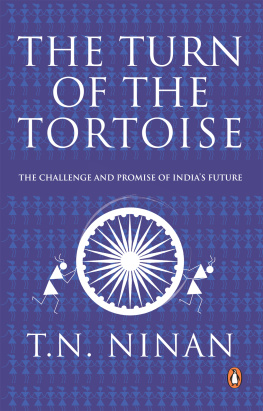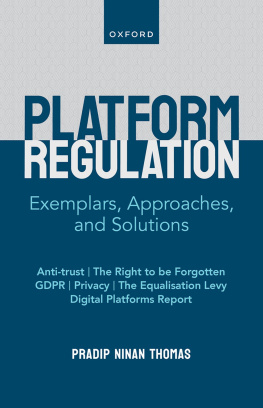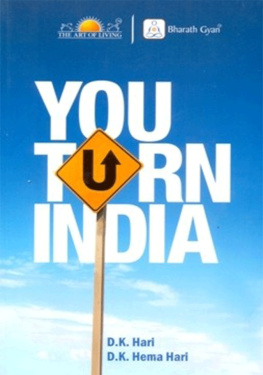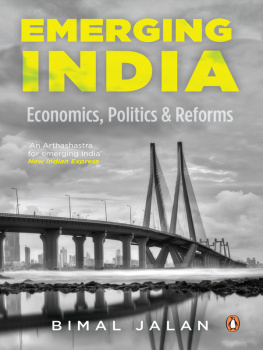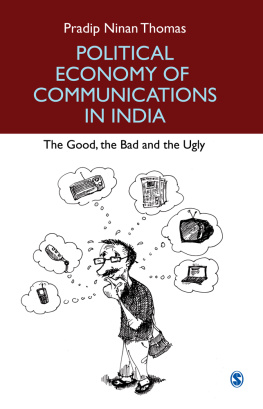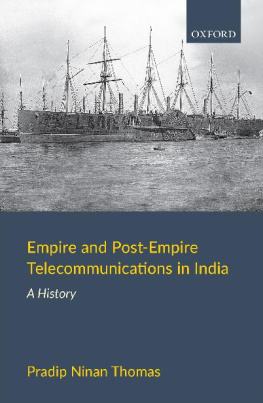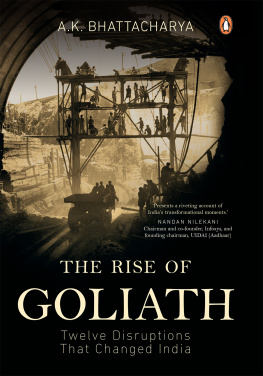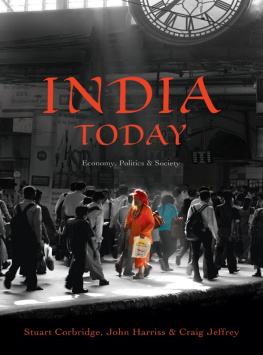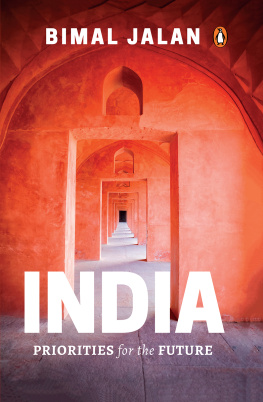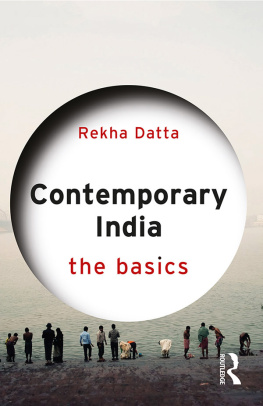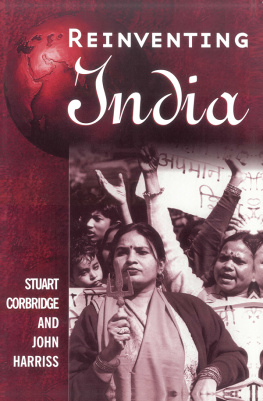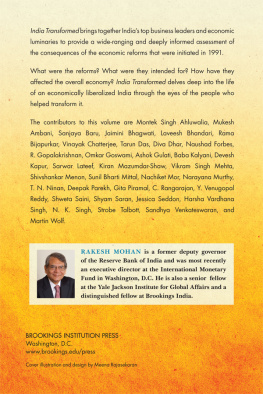About the Author
T.N. Ninan gave fresh shape and brought a new liveliness to business journalism in India during a quarter century of leadership at India Today, the Economic Times, BusinessWorld and finally at Business Standard, where he also served as the publisher before becoming its chairman. His Saturday column Weekend Ruminations has a dedicated following. He serves on the boards of non-profit organizations, including one that supports public-spirited journalism. This is his first book.
Acknowledgements
This book began as a joint exercise with Vijay Joshi, emeritus fellow at Merton College in Oxford, who proposed the idea over a lunch, in January 2012. We worked on book contracts and then the reading and writing, till it became clear that the two writing styles would not fit well between the same covers. We decided, amicably, to do two separate books and to minimize the overlap (Vijays book will be published by Penguin Random House in 2016). I have benefited greatly from the partnership; Vijay has been a reassuring sounding board for testing ideas, a valuable source for suggestions on readings and new lines of thought, and a gracious host at Oxford. I would not have ventured on a book project on my own; were it not for Vijay, this book would not have been written.
Thanks are due also to the Jawaharlal Nehru Memorial Fund, which honoured me with the generous Nehru Fellowship for 2013 and 2014, and funded my travel and book-buying. My thanks to the trustees of the Fund, especially Karan Singh and Suman Dubey. Mahesh Rangarajan, director of the Nehru Memorial Museum and Library, very kindly extended me the hospitality of a room for quiet work.
One of the gifts of journalism is that people who start out as sources become columnist-colleagues and/or friends. Another is that it offers a continuing, broad-spectrum education that beats anything you picked up in your college years. Over the decades, therefore, I have benefited enormously from friendship but also conversations with a range of economists spanning two generations: Vijay Kelkar and Surjit Bhalla, Montek and Isher Ahluwalia, Shankar Acharya and Rakesh Mohan, plus also Bimal Jalan, Nitin Desai, Kirit Parikh, Suman Bery, Deepak Nayyar, Subir Gokarn, Urjit Patel, Arvind Subramanian, Devesh Kapur, and yet more.
Editorial meetings at Business Standard have provided a stimulating forum for freewheeling discussion, enriched by the presence at different times of Ashok Desai, the late Sudhir Mulji, Deepak Lal, Ajay Shah, Haseeb Drabu, Bibek Debroy, Laveesh Bhandari, Shankar Acharya, Subir Gokarn, Shubhashis Gangopadhyay, Shyam Saran, Sanjaya Baru, T.C.A. Srinivasa-Raghavan and others. One could toss out ideas and questions and see how people usually better read than me responded. And Tarun Das has provided valuable opportunities for high-level interaction with decision-makers in half a dozen countries, through the Track II dialogues that he has organized over the years; these have helped me understand their strategic thinking and how they look at India. I owe a debt to him and all the others.
To Uday Kotak I owe more than I can say, personally and professionally. For the purpose of this book, I must thank him in particular for the clarity of his analysis and insights with regard to banking and related areas. To Bharat Sheth and Naresh Kotak, a special word of thanks is due for generous hospitality in Mumbai and Kodaikanal. Colleagues at Business Standard helped in different ways; my thanks to my long-term compatriot A.K. Bhattacharya who was always ready to help when asked, and also to Sanjay Sharma, Surinder Sud, C.E. Narasimhan, Dillip Satapathy and Raghuvir Badrinath. Others who helped (with data, opening closed doors, setting up visits, etc.) include Ajit Balakrishnan, Pradipta Bagchi, Arun Bharat Ram, Steve Biegun, Naresh Chandra, Raj Chengappa, Ashish Dhawan, Tony Jesudasan, Ranjan Mathai, Prasad Pradhan, Atul Punj, Jayadeva Ranade and Ajai Shukla.
Specifically for this book, I have met James Abraham, Arjun Asrani,Venkatesh Babu, Abhijit Banerjee, Chandrajit Banerjee, Nancy Birdsall, Robert Blackwill, R.C. Bhargava, Tejpreet Singh Chopra, Venugopal Dhoot, Arunabha Ghosh, Jamshyd Godrej, Ashok Gulati, Gajendra Haldea, S. Jaishankar, Amitabh Kant, the late Surinder Kapur, Satish Kaura, Lars-Olof Lindgren, Arun Maira, Sunil Mehta, Rinku Murgai, Srikanth Nadhamuni, Nandan Nilekani, Baijayant Jay Panda, G. Parthasarathy, Urjit Patel, P.S. Raghavan, Raghuram Rajan, S. Ramadorai, Jairam Ramesh, Kishan Rana, G.M. Rao, M. Govinda Rao, Shashi Ruia, Manish Sabharwal, Shyam Saran, Nik Senapati, Ajai Shukla and Gautam Thapar. The defence brass, diplomats of other countries, company executives and government officials who met on condition of anonymity have my thanks too, as also those too numerous to name whom I met on visits to factories, shipyards, laboratories, educational establishments and elsewhere. If I have forgotten to mention anyone who deserves mention, I offer my apologies.
A first-time author is naturally nervous about a book that is meant for the lay reader but which must pass muster with the experts. So I offered different chapters for critical comments and feedback to Shankar Acharya, Surjit Bhalla, Ramachandra Guha, Bimal Jalan, Pratap Bhanu Mehta, Leela Ponappa, Shyam Saran, Chiki Sarkar and of course Vijay Joshi. They made many useful comments and suggestions; the responsibility for mistakes and shortcomings remains mine, of course.
Among those who have been in the publishing team that has put this book together, I must thank Chiki Sarkar who, as editor and publisher of Penguin Random House and even after she left the company, has been a source of encouragement, advice and perceptive criticism; my agent Catherine Clarke at Felicity Bryan who gently coaxed publishers to up their offers of advance royalties; my editor Udayan Mitra for his strong belief in the books message; my line editor Richa Burman for her deft editing touches; Jyoti Thapa Mani, an old colleague whom I called on for the design of the evocative cover; and everyone at Penguin Random House for bringing their enthusiasm and collective muscle to bear on the sales and marketing effort.
My secretary, Mahinder Singh, is owed a special thanks for fixing meetings, making travel arrangements, hunting down books that are out of print or not available in the country, negotiating price discounts with booksellers, and in general making life as hassle-free as possible.
My wife, Sevanti, bore the brunt by living with someone who was even less helpful around the house than usual, got on the treadmill even less than before, and who spread out books, reports and papersover the study that she vacated, then a second room and a third, before it was all done and mailed to the publisher. In Kerala, my forthright Travancorean relatives told her when she first visited as a young wife nearly four decades ago that Malayalis didnt say thank you to their spouses.This one does, many times over.
And to you who have bought (or borrowed) this copy, I hope the gruelling but also rewarding effort has produced a book worth reading.
1
A Question of Size
Commentaries on India sometimes refer to the fact that, in the first half of the eighteenth century, the country accounted for a fourth of the worlds total income, or GDP (gross domestic product). That compares with about one-fortieth today. The old glory did not mean much; it was merely a matter of the size of the population. In the pre-industrial age, incomes did not vary hugely across countries; if you had a larger share of the population, you accounted for a greater share of world GDP. Such income variations as did exist left the average Indian poorer than the average European of the time.
Economic size therefore tells only a part of the story. Even in the 1870s, a frequently famine-ravaged India could claim to be the worlds second-largest economy, next only to China. It was bigger than its imperial ruler, Britain, and accounted for an eighth of the world GDP at the time. But the lack of development and capabilities (human, industrial, technological, institutional) told a more material story. Indias per capita income at the time, according to the economic historian Angus Maddison, was three-fifths of the world average and only a sixth of prosperous Britains.

